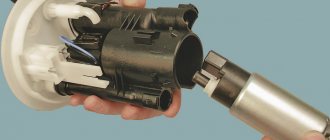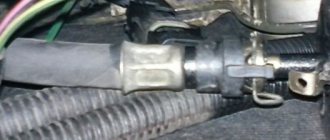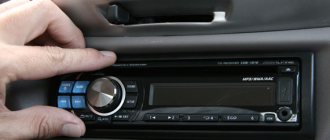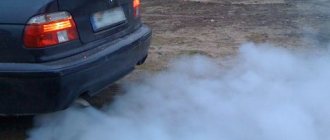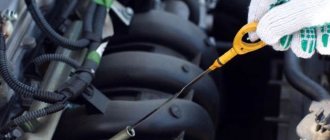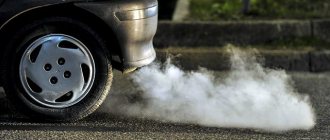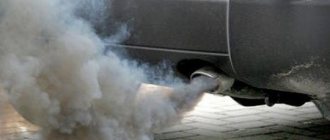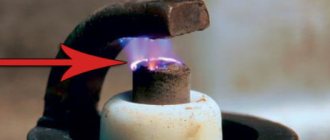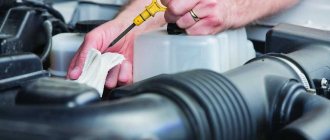If the cabin smells of gasoline when you start the engine, this is an alarm bell.
Let us note right away that there are many reasons why the smell of gasoline appears in the cabin when starting the engine. Among them there are both absolutely harmless (for example, supplying a rich mixture during a cold start) and alarming ones, for example, associated with a leaky fuel line. Only professional diagnostics will help determine the exact cause.
If you notice a smell in the cabin when starting a cold engine, then do not rush to worry. The fact is that when starting “cold,” the computer artificially enriches the mixture to make starting easier. Perhaps this is the only reason. However, it would be a good idea to inspect all hoses and connections of the fuel line for leaks. Start by checking the area under the car. Due to sudden temperature changes, pipes and hoses may crack. A fuel leak is accompanied by a characteristic “puddle”.
The presence of gasoline stains under the car indicates a leak.
Burning smell when starting the engine
If you smell a burning smell when starting the engine in cold weather, then first of all you need to determine the nature of the smell:
- sharp and caustic,
- sweetish,
- bitter, etc.
The sharp and acrid smell of burnt rubber indicates that pipes or seals are heating up somewhere in the engine compartment. A sweetish aroma indicates a leak of antifreeze onto a hot surface. The bitter smell is the smell of burnt motor oil. First of all, check the engine for leaks of technical fluids, and also make sure that no parts rub against hot elements - the exhaust system, exhaust manifold, etc.
Check all pipes for leaks, pay special attention to the tightness of the clamps
Note:
If you have technical problems with the Ford car brand - information!
Strong smell of gasoline when starting the engine
So, if when you start the engine you smell an unpleasant exhaust smell, the smell of gasoline or other odors, then there may be several reasons for this, which are listed in the table below.
| Cause | Description |
| Supply of rich mixture during cold start | If the smell goes away after some time, then most likely there is nothing wrong - the ECU simply supplies an enriched mixture for an easier cold start. |
| Injector malfunction | Accompanied by interruptions in fuel supply, engine tripping, and unstable starting. |
| Leaking fuel line | Increased fuel consumption, the presence of gasoline leaks, wet spots under the car - all this indicates a leak. The smell of gasoline lingers almost constantly. |
| Sensor malfunction | If the sensors give incorrect readings, the computer constantly supplies an enriched mixture. At the same time, the car loses power, the spark plugs quickly become covered with soot, and black or gray smoke is observed from the exhaust pipe. |
If the ECU supplies an over-rich mixture, this is invariably accompanied by a gray or black exhaust.
It happens that the driver smells oil when starting the engine. In this case, it is recommended to turn off the car and inspect the engine compartment. There is a high probability of engine oil leaking through the oil seals, oil filler plug, and dipstick shaft. Continued operation of the engine with constant oil leakage is extremely dangerous.
If you smell a strong oil smell when starting the engine, immediately turn off the engine and make sure there are no strong oil leaks!
LEAVE YOUR PHONE and we will contact you in 15 minutes
This problem, when the exhaust pipe smells of gasoline, haunts many car enthusiasts. Not only are everyone grown up and understands, gasoline is not something to joke about.
In addition to this problem, another nuisance is discovered - gasoline consumption increases. The first step when you discover these problems is to start an inspection from the hood to the gas tank.
There are often cases when the nut of the fitting for supplying the fuel line to the carburetor becomes loose, and the radiator fan blows gasoline vapors back to the muffler.
Next, you should go to the inspection hole and carefully inspect the entire path of gasoline from the gas tank
to the carburetor or injectors if you have an injection engine. All fittings and clamps on the connecting hoses of the fuel line should be tightened along this path.
There are often cases when on domestic cars, after just 3-4 years of operation, the walls of the gas tank resemble a sieve (the article "?" will immediately help). If, through inspection, you do not find any traces of gasoline leaks, then you should move on to a more in-depth study of this problem.
Tips and tricks
As a rule, in the event of a problem, it can be quite difficult to quickly determine why the exhaust pipe smells of gasoline, the smell of gasoline is detected when the windows are open, the smell of evaporating fuel is heard under the hood, in the cabin, etc. without proper experience. For this reason, it is optimal to deliver the car to a service station and show it to specialists who will inspect and perform computer diagnostics of the engine and its systems.
We also note that the situation when the smell of gasoline appears in the engine oil should deserve special attention. If the oil smells like gasoline, or you can hear a distinct smell of fuel coming from the oil filler neck, then the situation is serious. The cause is again incomplete combustion of the fuel, with unburned residues entering the lubrication system.
The greatest danger is that
presence of fuel in oil
indicates a decrease in lubricant viscosity and loss of other beneficial properties. As a result, the wear of the engine, its loaded parts and components significantly increases.
Most often, the most intense penetration of fuel into the oil occurs on a cold engine, since after warming up the fuel evaporates better and flows less intensively into the crankcase. In any case, the problem needs to be solved as soon as possible, since operating the engine with a gasoline-oil mixture in the lubrication system is highly not recommended.
Common motor problems
Does the exhaust pipe smell of gasoline and do you feel uncomfortable driving your car? The first step is to determine in which specific cylinder the fuel does not burn and is carried further along the exhaust manifold. A spark plug that is wet or has a greasy appearance than others will show you the main location of the gasoline leak.
If all the candles are evenly greased
, then open the oil filler neck and look at the condition of the oil and the presence of light brown foam on the neck cap. This foam indicates that because , the entire combustible mixture does not burn and fuel particles are carried away into the exhaust pipe.
If you have a compression gauge, this is easy to determine.
There are often cases
when the chamfer of one exhaust valve in the combustion chamber gradually burns out and through it the gasoline-air mixture constantly breaks into the exhaust pipe. An experienced mechanic will help eliminate gasoline leakage in it.
{banner_content} It is necessary to replace the piston rings, valves, and in advanced cases, the aluminum pistons themselves. That is, you are guaranteed an average engine repair. And yet, you shouldn’t rush into repairs at first.
Not everything is so bad
. A loose cap on the spark plug or a high-voltage spark plug wire with a breakdown will cause the spark plug to work intermittently, which will allow gasoline to flow freely into the exhaust manifold.
But don’t be alarmed if you see some kind of liquid pouring out of the muffler in a stream or drop by drop; this is not gasoline, but steam condensation that forms on the cold walls of the muffler when the engine starts. Although condensation can also smell like gasoline.
what to do, how to get rid of the smell?
Reasons for the smell of gasoline in the car interior.
The smell of gasoline in the car interior is not a minor problem that prevents you from driving safely. This is a signal that indicates that your car may have serious problems with the fuel system. There are many reasons why there is an unpleasant smell of gasoline in a car. Typically, the smell intensifies in the summer, because high temperatures accelerate the evaporation of fuel, which causes an unpleasant odor.
Why does the car smell like gasoline: reasons
Causes:
- Damage to the integrity of the vehicle's fuel tank. Most often, the problem is not at all in a broken fuel tank, or some kind of crack as a result of corrosion, but in seals that do not allow the filling tank cap to fit tightly. The rubber gasket dries out, allowing the smell of fumes to enter the cabin. This happens especially often in the summer. The smell intensifies just when a person is standing at a traffic light or during traffic jams.
- Malfunction of the exhaust gas catalyst in the car. The main purpose of this device is to burn the remaining fuel that comes out of the engine into inert gases. Over time, the catalyst becomes clogged and does not perform its functions. Accordingly, the remains of motor fuel that are not burned enter the atmosphere, and after that they can penetrate into the cabin itself, causing an unpleasant odor. This often happens to owners of old cars who replace catalysts with a muffler barrel.
Damage to the integrity of the fuel supply tube
Exhaust pipe smells like gasoline: reasons
- Another cause of odor, and the most dangerous, is a leak in the tank and fuel system of the car. This is very dangerous because it can cause a fire and even an explosion of the car. It is necessary to carefully inspect the car. Such problems occur when you drive on curbs or because stones get into the fuel tank while driving on rocky terrain or a road that is covered with a layer of gravel. As a result of the hole, fuel begins to ooze and the smell immediately penetrates into the cabin.
- The cause of an unpleasant odor from a car exhaust pipe may be wear and tear on the door trim near which the gas tank is located. Due to the fact that the door is not very sealed, the smell penetrates into the car interior.
- The cause may also be insufficiently tight fastening of the spark plugs, which allow fuel to pass through. The smell penetrates into the interior.
- The easiest way is to figure out the reason. A service station will help with this. They will very quickly determine what is happening with the car. For what reason is there an unpleasant odor in the cabin? Many people believe that for used iron horses, the smell of gasoline inside the cabin is the norm. Yes, indeed, this is due to the fact that the catalyst, that is, the filter, wears out, so the smell penetrates into the cabin.
Eliminate odor
The car interior smells like gasoline: what to do, how to get rid of the smell?
If you are sure that everything is in order with the car, and no leaks or damage were found at the service station, you need to deal with the smell of gasoline in the car’s interior. There are special means or traditional methods for this.
Review of folk recipes:
- The simplest remedy is to wash the seats and upholstery of the car, as well as the rugs, using a special product, car shampoo. If this does not help, you need to pour regular baking soda onto the seats and mats, slightly moisten the seats and leave for 24 hours. After this, everything is cleaned with a damp sponge. Next, cleaning is carried out with a vacuum cleaner.
- You can also deal with the smell of gasoline inside your car using vinegar. To do this, you need to prepare a solution, mix vinegar and water in a one-to-one ratio, put the liquid in a spray bottle and spray it on the car upholstery, as well as the carpets. After this, you need to let everything dry for 24 hours in the air. Therefore, it is best to remove the seats and floor mats from the car. After this, carry out the usual wet cleaning.
- You can cope with the smell using ground coffee. To do this, grind a handful of coffee beans in a coffee grinder, sprinkle on problem areas or the area where you spilled gasoline, which often happens in the trunk of a car when transporting a canister of fuel. After this, cover with an old rag and seal with tape. After a few hours the smell will no longer bother you. But don't rush to remove the coffee from the place. Leave it for several days. The fact is that coffee contains special oils that absorb odors. After some time, the smell of gasoline will be completely absorbed, all you have to do is remove the remaining coffee and vacuum the contaminated areas with a regular vacuum cleaner.
Restoring tightness
Do not rush to immediately use folk remedies and household chemicals. First of all, it is worth understanding the causes of the smell inside the cabin, and only after the causes of the leak have been determined and there are no causes, you can begin to eliminate the smell. Most often, the smell of gasoline in a car indicates a serious breakdown that needs to be repaired as soon as possible.
VIDEO: Smells of gasoline in the cabin
Rate this article
heaclub.ru
Injection problems
If you have a modern fuel-injected car, but the smell from the muffler appears like that of an old Volga
, therefore the fuel is re-enriched. One of the reasons for this is. Also on injection machines there is a valve that regulates the discharge of unused gasoline back into the gas tank. If it fails, the combustible mixture will be greatly over-enriched.
A faulty air mixture sensor creates the same problem. An experienced auto electrician will quickly fix these problems.
Do you have a modern car, but have you noticed that the exhaust pipe smells of gasoline? There is no need to panic, there is an explanation for this. A catalyst is installed in the exhaust pipe, which is required to clean and burn harmful substances and gasoline vapors found in the exhaust gases. But until the catalyst heats up to a temperature of 250°C, it does not clean anything.
Its operating temperature is 600-800°C
. That’s why Western experts recommend driving as soon as the car starts, so that the catalyst warms up faster.
Additionally, you should know that the lambda probe has practically no effect on a not warmed-up car. Therefore, the first minutes after starting the engine there is always an over-enriched mixture, which entails the smell of unburnt gasoline. After the car warms up, this unpleasant effect disappears.
This problem worries many motorists, because they are well aware that gasoline is not something to joke about. But another nuisance is added to this problem - fuel consumption increases. If such a problem is discovered, then the first thing to do is inspect the entire car body from the hood to the fuel tank. Sometimes it happens that the nut of the fitting connecting the fuel line to the carburetor becomes loose. The radiator fan blows gasoline vapors back to the muffler.
After discovering the cause of the malfunction, the car must be placed in an inspection hole and very carefully trace the path of the fuel from the fuel tank to the carburetor, and if the engine is fuel-injected, then to the injectors. It will be necessary to tighten all the fittings and clamps on the connecting hoses of the fuel line.
Often on domestic cars, after just 3-5 years of operation, the gas tank turns into a sieve. If during inspection no gasoline leaks were detected, then you should try to study this problem in as much detail as possible.
Main reasons
In no case can we say that the interior of only certain cars stinks of gasoline, such as Lanos, Lada Priora, VAZ, Hyundai Accent or Chevrolet Niva.
This problem is typical for all types of vehicles, regardless of make, model, year of manufacture and other factors.
It is unlikely that anyone will be happy with the fact that when you start the engine or just get into the cabin, a characteristic smell of fuel is heard inside.
This usually happens due to:
- gas tank leaks;
- leakage of tightness;
- problems in the output system;
- faults in the fuel line;
- spills, etc.
Now we will separately consider common situations that can cause the cabin to stink. And also ways to solve them.
Spilled gasoline
The most banal and quite common situation. The motorist, having bought a 20-liter gasoline can, filled it with fuel and put it in the trunk.
Either the lid was not screwed on, or the container itself was faulty or defective, which is why fuel gradually began to spill out of it. As a result, fumes and odors penetrated into the cabin.
There is no need to invent anything special here. Just remove the source of the leak from the car, clean up the spilled fuel, and that's it.
Traffic fumes
If the smell appeared when a window or door was open and the car was started, there is a possibility that the smell is caused by exhaust gas aromas entering the cabin.
In general, the very fact that the exhaust smells of gasoline is not very pleasant. This indicates incomplete combustion of the fuel. And here the reason may lie in an incorrectly configured carburetor, problems with the injector control unit, oxygen sensor and many other components.
Therefore, a comprehensive diagnosis will be required here. Only if you are not sure exactly why the fuel does not burn completely, and this manifests itself in the form of a characteristic smell of gasoline from the exhaust pipe.
Fuel filler cap
To be more precise, a violation of its tightness can cause the smell of fuel to appear inside the vehicle.
Depending on the specific car, the neck is welded to the tank, or connected through a rubber gasket.
Violation of the integrity of the connection leads to corresponding consequences. But the smell in the cabin is only one of their problems. The solution is to restore integrity through repair or replacement.
Fuel filter
The fuel filter can also be blamed.
Especially if the situation in question arose after the recent replacement of this filter element.
The reason is an incorrect replacement, an insufficiently tight connection or a manufacturing defect. The last sin is the cheapest filters.
It is worth checking the condition of the filter, trying to install it more tightly, or replacing a defective consumable.
Catalyst
Responsible for cleaning exhaust gases from vehicles.
If the catalyst fails, it can cause a number of troubles. Among them is the unpleasant smell of fuel inside the car.
The catalyst is quite a serious thing. By the way, we have a whole series of useful and interesting materials on this topic. Namely:
- replacing the catalyst with a flame arrester;
- checking for clogging;
- removal of the catalyst.
Be sure to read it. This will be especially useful for those who decide to independently eliminate the problem of fuel smell in the cabin due to a failed catalyst.
Gasoline pump
This unit can confront the car owner with such a problem as a leak.
The fuel pump usually leaks due to a violation of the integrity of the gaskets, damage to the membrane, and also due to a simply poorly tightened fuel line fitting.
For repairs you will need to buy a repair kit. The procedure for replacing components is not complicated, and therefore you can safely do it yourself.
Fuel line
As you know, in most cars the fuel tank is located at the rear, while the engine, like the entire fuel combustion system, is located in the front of the car.
All pipes and pipes connecting the tank to the engine are called the fuel line.
Carefully examine the condition of all tubes and hoses. If there are traces of fuel leakage under the hood or under the bottom, you need to find weak points and restore their integrity. Sometimes this requires a complete replacement of part of the line.
Watch this video on YouTube
That's all we have
Thank you all for your attention! Subscribe, comment, ask and tell us about us!
Subscribe, comment, ask and tell us about us!
Possible engine problems
Does the muffler smell like gasoline and is it not very comfortable to drive? Then, the first thing to do is to unscrew the spark plugs and try to understand in which of the cylinders the fuel does not burn and passes further through the exhaust manifold. The location of the gasoline leak will be indicated by a wet or greasy spark plug.
It is not uncommon for the chamfer of one of the exhaust valves in the combustion chamber to burn out. It is from there that the fuel-air mixture exits into the exhaust pipe. An experienced auto mechanic can help eliminate the penetration of the gasoline mixture.
It will be necessary to change the rings on the pistons, valves, and sometimes the pistons themselves. So, we can assume that the car owner is provided with an average repair of the power unit. However, there is no need to rush into repairs; first, it is better to diagnose the engine, because not everything is always so hopeless.
A poorly fitting spark plug cap or high voltage wire can cause the spark plug to operate intermittently. This may allow fuel to flow freely into the exhaust manifold. There is no need to be alarmed if some kind of liquid suddenly pours out of the muffler, because it is not fuel, but condensation formed on the walls of the muffler when starting the engine. Of course, it may smell like gasoline, but don’t worry, it’s not gasoline.
Finding gasoline leaks and how to fix the problem
First, you need to determine exactly where the fuel is leaking, since this is unsafe and, if gasoline gets on hot surfaces, the risk of fire is very high. The work is not complicated and is carried out according to simple instructions:
- First of all, turn off the car and determine where the smell is strongest. Just walk around and you can almost always figure out which part to look for the problem in.
- Carefully inspect the engine compartment for leaks. This is done first with the engine turned off and then with the engine running. Often, a leak appears only after startup, when the pump creates pressure in the fuel system.
- Check the tank neck and plug for leaks. Again, in case of violations, the smell of fuel will be clearly audible. Fuel lines are also checked with the engine running; under pressure it is easy to notice drops under the bottom if there is a leak there.
- When the smell is best heard inside the car, it is worth removing the plugs above the fuel pump and pressure sensor, most likely the problem is there.
Repair depends on the nature of the problem. Most often, it is necessary to replace the damaged element, since it is difficult to repair a leak and this will not give a long-term effect. If the problem occurs on the road, the damage can be repaired by cold welding if the surface is first cleaned and degreased. And small cracks are simply filled with laundry soap - this is an effective solution for a short time.
Problems of a modern engine
If you drive a modern fuel-injected car, and the Glushak “rushes” like an old Volzhana, we can conclude that the fuel is being over-enriched. The cause may be improper operation of the lambda probe. On fuel-injected cars there is a valve that regulates the discharge of unburned fuel back into the gas tank. If it breaks down, the gasoline will be very rich. A failed air mixture sensor can create a similar problem. An auto electrician will be able to “deal” with such a malfunction very quickly.
Consequences of operating a car with damaged oil
The properties of motor lubricant are disrupted when mixed with fuel. Viscosity decreases, the effect of additives is neutralized. Working parts are subject to early wear.
Using spoiled fuel and lubricants leads to the following problems:
- The operation of the crankshaft is disrupted. Early wear of the bearings and the formation of scoring lead to jamming of the engine.
- The piston system falls apart as a result of deposit accumulation and detonation of the fuel mixture.
- Exhaust valves are destroyed. Deposits impair the sealing of connections. Combustion of the mixture damages parts.
- Wear of piston rings and cylinders is a consequence of exposure to high temperatures.
In such a situation, wear of the mechanisms quickly occurs, which will lead to engine failure.
Fuel consumption during vehicle operation increases. Detonation of the fuel mixture increases the risk of fire.
Attention to the running engine and timely detection of fuel leaks preserve operational properties and save from the development of dangerous situations.
What to do if the muffler smells of gasoline?
First of all, there is no need to panic, because this can be easily explained. The task of the collector, located in the exhaust pipe, is to clean and burn off fuel vapors that remain in the exhaust gases. Until the catalyst warms up to 250 degrees, it will not clean anything, because its operating temperature is 600-800 degrees. Therefore, it is recommended to drive immediately as soon as the car starts. This will allow the catalyst to warm up faster.
Let's start with the fact that during the operation of the vehicle, drivers in some cases note the appearance of a distinct smell of gasoline in the cabin or while being near the car.
It is important to understand that this sign indicates the need for immediate diagnostics, since the smell of fuel often indicates depressurization and fuel leaks.
In this article we will talk about why there is a smell of gasoline in the cabin when starting the engine or a smell of fuel when standing near a car with it running or turned off, as well as what the driver should do if such a malfunction is detected.
Read in this article
Fuel pump manhole cover
This situation is relevant for injection engines. They have a cap attached to the fuel tank that holds the high pressure fuel pump and fuel level sensor, which are located inside the tank. Said cap is usually attached to the tank with screws and there is a sealing gasket underneath the cap. It is this that can become leaky over time and allow gasoline evaporation from the fuel tank to pass through. This is especially true if the fuel pump and/or fuel level sensor or fuel filter were recently repaired or replaced before the situation when the smell of gasoline appeared in the cabin (the cap is often unscrewed to clean the coarse fuel mesh). During reinstallation, the seal may have been broken.
Elimination of consequences consists in correct installation or replacement of the mentioned gasket. It also makes sense to use an oil-resistant sealant. Experts note that the gasket mentioned should be made of gasoline-resistant rubber. Otherwise it will swell. It is also noted that the smell of gasoline is especially noticeable after refueling if the gasket on the gas tank is leaking. Therefore, it makes sense to also check its geometric dimensions and general condition (whether it has shriveled or, conversely, swollen). If necessary, the gasket must be replaced.
There is a smell of gasoline in the car: reasons
So, let us immediately note that the smell of gasoline in a car may not appear all the time, but only under certain conditions. For example, in severe frosts or heat, when a cold engine is just starting or after the power unit has warmed up, when refueling, etc.
In any case, it is necessary to establish the reason why the odor occurs. Note that in some cases it is quite difficult to quickly solve the problem. It is necessary to check the elements of the fuel system step by step.
- First of all, you need to start diagnosing with the gas tank and its cap. The tank, especially on older cars, can rot. The tank mounts also suffer, as a result of which it begins to shift. Also, over time, welds, etc., become unusable.
The possibility of mechanical damage should also not be excluded. One way or another, even a minor leak will mean that fuel leaks out, filling the car interior with fumes, etc.
The cap, which is screwed into the filler neck, also deserves special attention. In many cases, this area is the source of the gasoline smell. The fact is that the lid not only tightly closes the tank, but also has an additional valve.
This valve is needed to avoid an increase in pressure in the tank during temperature fluctuations and expansion of gasoline with heating. If the valve is clogged or stuck, or there are problems with the sealing gasket of the cap, then a distinct smell of gasoline will appear.
- Let's move on. If everything is normal with the tank, then you need to inspect the fuel line, connections and clamps, and also check the integrity of the pipes. Along this line, gasoline is both supplied to the internal combustion engine (supply) and its excess is returned back to the tank (return).
Hoses may begin to leak, and the reliability of their fastenings will deteriorate. It is quite obvious that in this case a leak also occurs, and gasoline fumes will annoy the driver with the smell of fuel in the cabin.
The next element to check is the fuel pump. On cars with a fuel pump, it is often located under the hood or outside the tank. At the same time, the fuel pump is submersible (located in gasoline to take fuel and cool it), that is, it is actually “screwed” into the gas tank. As a rule, on many cars with an injector, the pump is located under the rear seat right inside the vehicle.
If problems with the gasket appear at the installation site of the electric pump, the thread of the cover is cracked or damaged, etc., then a persistent smell of evaporating gasoline appears in the cabin.
Fuel filters, especially if they are dirty and have reduced capacity, can also cause the smell of gasoline in the car. The reason is an increase in pressure in the fuel line, after which the joints of the pipes begin to leak; gasoline can flow at the “input” before or at the “outlet” after the filter itself.
To eliminate this cause, the fuel filter needs to be changed, and as part of further operation, select the correct element for a specific car and replace the filter according to the regulations, avoiding severe contamination of the filter element.
- The power supply system with a carburetor requires a separate check of this fuel supply system to the engine. Often, its incorrect adjustment or device malfunctions lead to gasoline overflowing.
Naturally, active evaporation of fuel in the engine compartment will cause gasoline vapors to enter the cabin. To prevent this from happening, it is necessary to correctly adjust the fuel level in the float chamber, check the condition of the jets regularly, etc.
Crack between tank and neck
In most modern cars, the gas tank design consists of two parts - the tank itself and the neck welded to it. The weld is made in a factory setting, but over time (due to age and/or corrosion) it can delaminate, thereby causing a crack or a small pinhole leak. Because of this, gasoline will get onto the inner surface of the car body, and its smell will spread into the cabin. This defect especially often appears after refueling or when the tank is more than half full.
There are also models (although there are few of them) that have a rubber gasket between the neck and the tank itself. Over time, it can also crumble and leak fuel. The consequences of this will be similar - the smell of gasoline in the cabin.
To eliminate this problem, it is necessary to inspect the tank body, and also look for fuel leaks on the tank body, as well as on the elements of the machine body located underneath it. If a leak is detected, there are two options. The first is a complete replacement of the tank with a new one. The second is the use of the already mentioned softened laundry soap. With its help you can close the gap, and as practice shows, you can drive with such a tank for several more years. Which of these options to choose is up to the car owner to decide. However, replacing the tank will still be a more reliable option.
An interesting and quite popular reason (especially for domestic cars) that the smell of gasoline appears immediately after refueling is that the rubber tube connecting the neck of the gas tank to its body has leaked. Or another similar option could be when the clamp connecting this tube and the gas tank does not hold well. During the refueling process, gasoline under pressure hits the rubber band and clamp, and some of the gasoline may end up on the surface of the tube or said connection.


